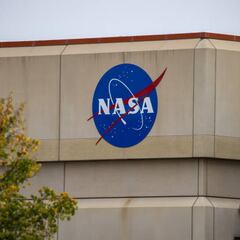NASA DART spacecraft mission succeeds in knocking asteroid off course
The space agency says its mission two weeks ago to knock an asteroid out of orbit with a spacecraft was a success.


On September 26, a spacecraft weighing 570kg was fired into the asteroid moon Dimorphos. The aim was to shift the orbit of the moon to prove it would be possible to alter the direction of space debris that could threaten Earth in future.
It succeeded in this aim by knocking the asteroid off course by 32 minutes. Both the impact of the spacecraft and the aftermath was caught on camera by NASA’s two sapce telescopes, Hubble and James Webb.
Lori Glaze, director of Nasa’s planetary division, said at the press conference, “Let’s all just take a moment to soak this in. We’re all here this afternoon because for the first time ever, humanity has changed the orbit of a planetary body.”
CONFIRMED: Analysis of data obtained over the past 2 weeks by the #DARTMission team shows impact with Dimorphos has successfully altered the asteroid’s orbit by 32 minutes - marking the 1st time humans have changed the orbit of a celestial object in space! https://t.co/MjmUAFwVSO pic.twitter.com/4Qiy1mC4gK
— NASA Asteroid Watch (@AsteroidWatch) October 11, 2022
Scientists are excited that the breakthrough could lead to a future in which our planet is protected from asteroid destruction like that which eliminated the dinosaurs.
“I am absolutely thrilled about today’s announcement of the orbital period change due to the DART impact,” said Cristina Thomas, Dart’s principal investigator.
“I am constantly impressed by this team and the phenomenal observations that they were able to collect in the two weeks since the impact. Our team has been preparing for these observations for years as we worked to understand the pre-impact orbital period and this result is a testament to how prepared we were for this moment.”
What is the future of the DART mission?
The DART team will need at least two months to monitor the asteroid’s change of speed and movement to calculate whether the impact changed course. But, for now at least, it appears that the program has been a success.
NASA’s #DART mission successfully changed an asteroid’s natural orbit – the first time humanity has altered the motion of a celestial body. It also marked the world's first test of a planetary defense system https://t.co/jIIYl1ecpV 🚀☄️ pic.twitter.com/RkKPxtGqA2
— Reuters (@Reuters) October 12, 2022
Related stories
September’s mission was the culmination of a launch taking place back in November 2021. Scientists had been eagerly awaiting the first impact of DART with the moon.
According to The Planetary Society, a foundation supported by scientists like Bill Nye and Neil deGrasse Tyson, the programme will cost in total $324.5 million.

